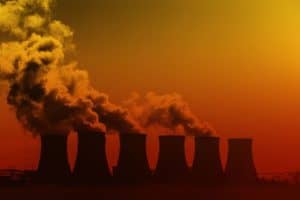
Nuclear reactors are highly vulnerable to radioactive meltdowns in an era of rising climate disasters.
Creedit: Dedmityay/Getty
Imagine this scenario: You are driving home from work one evening, and you notice a strange metallic taste in your mouth. That night on the evening news, you hear there’s been an accident at the nuclear plant in your community, but that everything is under control.
The next day, the metallic taste is stronger, and you see a rust-colored ring around the bathtub when you drain it. Public announcements continue to say everything is OK. Your eight-month-old daughter has been playing outside much of those two days.
The following day, the governor announces that pregnant women and women with preschool children within five miles of the plant should evacuate. You flee in terror with your daughter, husband and a friend, driving more than 250 miles to a town south and east on the coast. Before you go, you notice a strange thick, heavy, slightly glowing orange haze around the nuclear plant and over the area.











We should have never have allowed anything Nuclear to be built; not weapons, power plants, or the wartime bullets tipped with radiation. Now we are stuck with so many Nuclear stockpiles that we have no place to put anymore. The only solution is to find a Nuclear eating bacteria or something of the sort which can eliminate the radiation.
Even without climate instability storing huge amounts of nuclear material that will require cooling and shielding for at best 10s of thousands of years is not possible. The one possibility I have read about is a thorium reactor that could be fueled in part by this stored material that cannot be used by current reactor types.
Thorium based reactors were studied and development work done in the 1960s then shutdown. Now a number of nations are working on the technology with India, China and Canada leading the way. If someone can pull it off then perhaps in the distant future new thorium reactors could be built at some old reactor sites utilizing stored waste and the electrical systems in place to provide power while reducing waste. While these reactors also produce waste it is not as long lasting and could be a viable alternative or it could be another tech fix that isn’t.